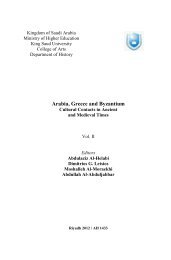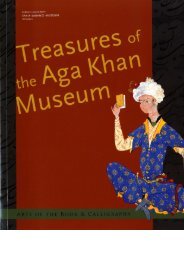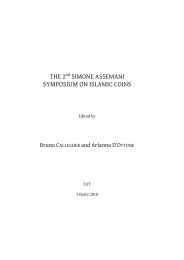ulum-al-quran
ulum-al-quran
ulum-al-quran
You also want an ePaper? Increase the reach of your titles
YUMPU automatically turns print PDFs into web optimized ePapers that Google loves.
Summary<br />
From these different opinions, of which only some have been listed above, by way of illustration, a gener<strong>al</strong>ly-accepted<br />
conclusion is that the 'seven modes' are at the basis of sever<strong>al</strong> distinct ways of reciting the Qur’an, reflecting the different<br />
usage at the time of revelation, comprising variations in pronunciation and even minor differences in wording. The 'seven<br />
'ahruf are however, not identic<strong>al</strong> with the well-known 'seven readings'. These came about in a later age. Although much<br />
of what the 'seven readings' contain is <strong>al</strong>so found in the seven ahruf, there are some differences, which will be explained<br />
when discussing the seven readings.<br />
Only a few examples for 'ahruf have been transmitted to us. They are of importance for Tafsir, rather than qira'a.<br />
Seven Modes in the Qur'an<br />
While some scholars [e.g. Tabari, Jami' <strong>al</strong>-bayan 'an ta'wil ayat <strong>al</strong>-Qur’an, Cairo, 1968. See introduction to this tafsir.<br />
Zarkashi, Vol. 1, p.213 says most scholars are of the first view, and that the last double-reading of the Qur'an by<br />
Muhammad in the presence of the Angel Gabriel served, among others, the purpose of eliminating the other six modes.]<br />
hold that the written Qur'an now includes only one of the 'seven modes', and the others are transmitted or<strong>al</strong>ly to us,<br />
there is some evidence <strong>al</strong>so for the view that the text of the Qur'an, as we have it in front of us, may include <strong>al</strong>l these<br />
'seven modes' because:<br />
<br />
<br />
<br />
No one would change the Qur'an.<br />
The present text was written upon the basis of the sahaba testimonies, both or<strong>al</strong>ly and written, going<br />
back directly to the Prophet.<br />
The Qur'an is protected by Allah.<br />
THE VARIOUS READINGS<br />
Al-qira'a (pl. qiraa'at) is derived from the word qara'a, 'reading, reciting'; from which <strong>al</strong>so the word Qur'an is derived. It is<br />
a verb<strong>al</strong> noun, meaning recitation. In technic<strong>al</strong> language it describes the or<strong>al</strong> recitation of the Qur'an as well as the<br />
punctuation of the written text, which corresponds to the or<strong>al</strong> recitation.<br />
Examples:<br />
Mawdudi [Introduction to the Study of the Qur’an, Delhi, 1971, p.21.] has very convincingly explained the proper<br />
understanding of some accepted difference in reading. He wrote that in <strong>al</strong>-fatiha (1: 3): the readings "m<strong>al</strong>iki" and "<br />
mâliki " both describe one of the attributes of Allah, and there is absolutely no contradiction between 'sovereign' and<br />
'master' of the day of judgement, but 'these two readings make the meaning of the verse <strong>al</strong>l the more clear'.<br />
Similarly 5:8 arjulakum [Reading of Nafi, Hafs 'an Asim, Kisa'i.] and arjulikum [Reading of Ibn Kathir, Abu Amr, Abu<br />
Bakra 'an 'Asim, Hamza.] carry two meanings: "Wash" or "Wipe" your feet<br />
Both are indeed correct, for under norm<strong>al</strong> circumstances a man will wash his feet, while some other person e.g. a traveler<br />
may wipe them. Here the text of the Qur'an carries both meanings at the same time. This is indeed a unique feature of<br />
the revelation from Allah.<br />
Readers among the Sababa<br />
Reading and reciting of the Qur'an has been done since revelation began, and the Prophet was the first to recite. This has<br />
<strong>al</strong>ready been discussed in the section on transmission of the text. After his death, the recitation continued through his<br />
Companions. Among the famous readers from whom many of the tabi'un learned, were Ubay bin Ka'b, 'Ali, Zaid bin<br />
Tbabit, Ibn Mas'ud, Abu Musa <strong>al</strong>-Ash'ari and many others.<br />
Later Development<br />
Later on, with Muslims settling in many parts of the world, the Qur'an was recited in a variety of ways, some of which<br />
were not in accordance with the accepted text and the transmitted readings from the Prophet and the Companions. This<br />
necessitated a thorough screening and distinction between what is sahih (sound) and what is shadh (exception<strong>al</strong>).<br />
The Seven Readings





